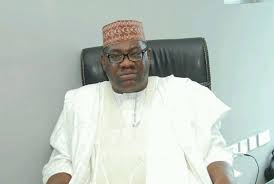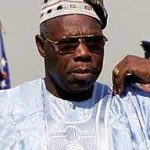Mahmud Jega’s piece of Monday told the story of the collapse of the shopping complex near the headquarters of MEDIA TRUST last Tuesday. Just like he reported, we were all shocked about the collapse even when it seemed like an accident waiting to happen. Each week, we saw the dizzying pace of work and always wondered about the obvious lack of development control supervision and the sub-standard quality of the masonry. So when the building came down with an earthshaking thud, it became a self-fulfilling prophecy, tragic though it was!
But the most poignant point was the level of helplessness which the main institutions that showed up betrayed. There were ambulances and vehicles from the Road Safety Corps, their personnel seemed to be caught up in a trance, obviously paralyzed for initiative; the fire brigade drove around for a while but was not immediately useful in the first hour of the tragedy. As a crowd gathered, imagination ran riot; there was rumour; unsubstantiated accounts; anger; the Nigerian penchant for citizen initiative, which might help and hinder at the same time!
Tragedy brings out the best and the worst in people, and all of those were on display last Tuesday. I think that Nigerians have a deep sense of hurt and anger about the fact that a lot of things don’t work right in our country, but we often tend to respond to that with an anarchic individualism, not taking our anger towards constructive channels of expression or positive resolutions. Somebody cursed Nigerian professionals for the shoddy work unable to link that to the general state of decay that is all round us. But I think the best expression of frustration came from another individual who said that nobody of public stature had shown up in the first few hours of the tragedy; however, if it was to rig elections, everything would have been put in place!
In the hours after witnessing the helplessness that soon became part of the “tragedy tourism”, I have reflected on the absence of basic education in Nigeria about accidents and emergencies in our country. We don’t plan for the eventualities and accidents that constitute vital parts of societal existence; therefore, more often than not, we end up at the receiving end of citizen initiatives that can be full of zeal and sympathy but in the long run could cause far more damage than ordinarily would have been encountered if there was education or a very efficient national emergency system.
I speak from personal experience here. In February 2000, I was involved in a very horrible accident on the Mokwa-Jebba road. We had attended the National Council on Information at Abuja and were on our way back home. My driver as attempting to overtake a group of trailers when we had a head-on collision with an oncoming one; instinctively, he turned the vehicle away from himself and the side where I sat took the full impact of the collision! Over the next several minutes, the good Nigerian Samaritans used all kings of implements, from cutlasses to axes, to cut the badly damaged door of the vehicle in order to free me from the wreckage.
One of those brave individuals found his way into the vehicle from another side and made a grab for my limb. The problem was that the left leg that he grabbed, as we would discover hours later in hospital, was badly fractured and in response to his effort, I had shouted and begged that he left me alone. The man got angry that I dared to make such a request “I am trying to help you. If you don’t want me to, they you can choose to die in the car!” he shouted at me and stormed out of the vehicle angrily. Eventually, they brought me out and when I passed out, they got a bucket of water from somewhere and poured on me to shock me back to consciousness before I was eventually evacuated to the hospital!
I am sure most readers are very familiar with the description of my experience. We are a very wonderful people, the Nigerian people. We come out of traditional cultures and belief systems which emphasize giving assistance to people in distress. However, modernity arrived with a baggage of occurrences, including emergencies and accidents which demand that only those with the requisite training and education should even make an effort to carry out sophisticated rescues beyond the initial first aid, which might also require some from of knowledge, by the way. In a lot of instances, the zeal to assist becomes a death sentence for the victims of the accident. There have been cases of people with spinal cord injuries who might have been saved if they were properly stabilized and then professionally evacuated, but whose mishandling by “good Samaritans” and the dilettante end up becoming completely paralyzed.
When I was growing up, young people who joined the scouting movement, the Red Cross, Boys Brigade or the Man O’ War movement learnt some basic courses in survival and in emergency assistance; and as a boy scout, I used to be involved in regular drills which our scout master such as the late Rev. Ayo Bello, Alhaji Sa’adu Laofe and the late Malam Zarumi and others told us would be useful in emergencies. Today, the organizational basis for an educated citizens’ participation in emergency response seems to have evaporated, because it is not adequately developed and the processes are not deployed as they ought to as we have seen in several tragedies that we have harvested over the years.
I have had the privilege of participating in a programme of the National Emergency Management Agency (NEMA) in the past. I was very pleasantly surprised and happy about their plans to coordinate emergency response with the armed forces, paramilitary organization and so on. The fact that modernity brings a sure baggage of accidents – emergency and disaster – makes it imperative to fund NEMA adequately, while also putting in place a process of citizen education in Nigeria to respond to emergencies in those first few critical hours before the experts come to do the real job.
As we saw last week in Jabi during the collapse of the shopping complex and with other emergencies in recent response can they actually help. What happens today is spontaneity and zeal without basic education, but a lot of good intention. But as we all know, even the road to hell is paved with good intentions!
Nigerian images from America
THE GUARDIAN newspaper of Sunday, July 27, 2008, carried two pictures on its page nine of a certain Captain Omolola Makinde from Columbus, Ohio, USA. The story said that Captain Makinde is a Nigerian from Ekiti State, but he is currently on combat mission in Iraq. In the pictures, he is said to be patrolling past a mosque in the Taji Oada quarters in the north-western part of Baghdad. The story said the patrol was “ensuring the residents in the region remain free of criminal activity”. There is no doubt that a propaganda picture has been smuggled into the Nigerian media to present a Nigerian as part of the American Army; maybe as a recruitment sergeant of some sort for other Nigerians, especially those resident in the United States.
The story tries to run away from the politics of the situation, telling us that “it may seem far-fetched but it is true that Nigerians are now found in most critical sectors of the American society diligently pursuing their chosen careers and contributing to the uplift of the most powerful country in the world, the United States of America”. This is the propaganda line; the truth is that in recent years, immigrants from around the world are being recruited to serve in the US army and are then taken to fight and die in the various wars of aggression, which American imperialism fights in countries such as Iraq and Afghanistan. Of course, they get a good pay and other facilities, but we must see through the propaganda. The Anglo-American invasion and occupation of Iraq is unjust and illegal. It is an act of brigandage which the whole world condemns. Over one million Iraqis have lost their lives since the invasion. It is therefore preposterous to present the criminal illegality as something normal in a Nigerian newspaper. My heart bleeds that a Nigerian citizen will not get the opportunities to actualize his potentials in our country; he cannot get the level ground to contribute to the building of Nigerian. However, they can become mercenaries fighting and dying for unjust causes in the Army of imperialism.
Similarly, THE SUN newspaper of Tuesday, August 5, 2008, carried a story of a “Nigerian in US murder mess”. The story is about a certain Michael C. Iheme, a Nigerian in a country in Missouri, who “gunned down his wife in cold blood”. Iheme, according to the account, “shot his estranged wife Antonia in a parking lot and calmly called police and said, “I have killed the woman that messed my life up, a woman that had destroyed me”. The details are not what should detain us here, and in any case, it might be argued that there are domestic quarrels everywhere; some of them end up in tragedies, such as the Iheme and Antonia case here.
However, it is the background that is disturbing. The report went further that “American law enforcement agencies have reported a disturbing increase in the number of domestic abuse cases involving Nigerians. According to records, over 500 Nigerians are in jail or awaiting trial in several states for killing their spouses. Social workers attribute the trend to pressure and stress of juggling sometimes multiple jobs and family while trying to keep up with the expectations of their families in Nigeria”.
The sociology of this background speaks volumes about the tragedy of our national condition. Many of our compatriots locate to the advanced capitalist countries where conditions are much better, but where the iron laws of capitalism oblige them to work sometimes in many jobs to be able to make ends meet. Many of the men still carry consciousnesses derived from pre-capitalist, often patriarchal, cultures to the new settings of advanced capitalism and expect marital life in that setting to be conducted within the patriarchal settings that they brought from Nigeria.
The women have borrowed notions of women’s rights that derive from the traditions of the advanced capitalist societies. They refuse to be battered and domestically-violated and then keep quiet as they might have done in Nigeria. Then added to that is the pressure of work where women might be breadwinners. The man feels inadequate, but he wants to lord it over the woman, again within the settings they have come from. Of course, the women resist and in many cases even get the men ejected from homes. The alienation becomes total.
In the meantime, people left at home in Nigeria believe that their son in America is a successful man. Sometimes, he visits home for a week or two and tries to play the part, spending a few hundred dollars taken from the wife or the proceeds of crimes or from working in two or three jobs! When the reality of juggling all these experiences catches up, tragic violence can be the result. This is the context within which the story about Nigerian domestic violence in America must be understood. Our country must be made better for all our people, so citizens can proudly work and live at home!


